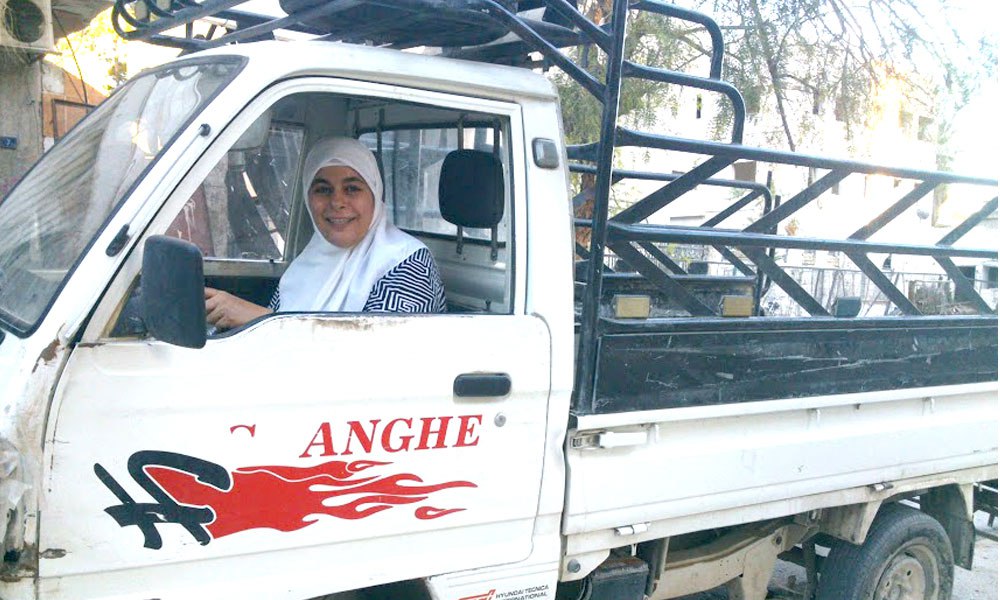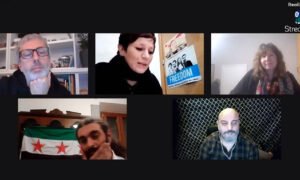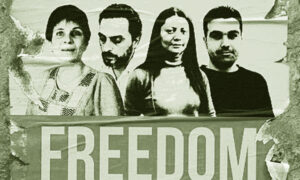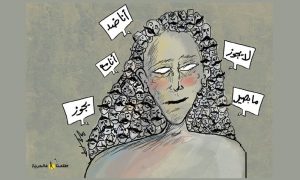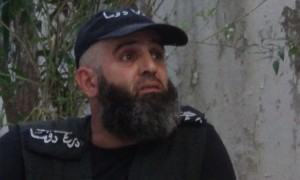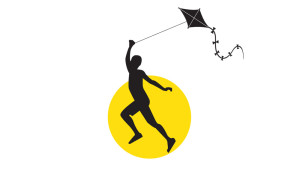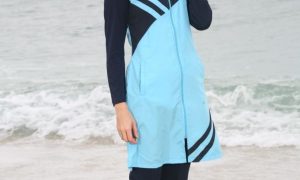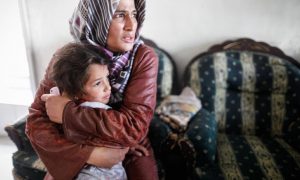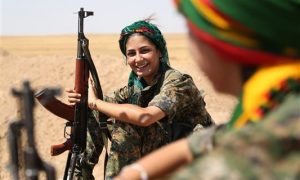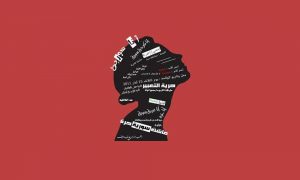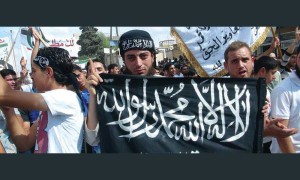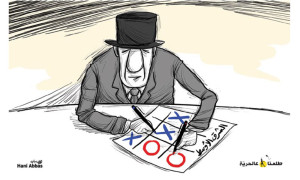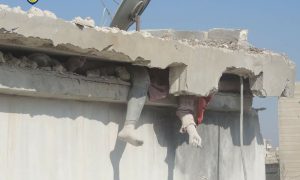By Osama Nassar
Our Suzuki pickup could barely find its way through the rubble in an area pockmarked with the shells that landed on Jobar, the area in Ghouta nearest to Damascus. The daily ceaseless shelling turned the area into piles of debris, parts of it remain inhabited. New roads and alleys were dug through the rubble.
It wasn’t time for prayer, but the Imam was waiting by the entrance of what was left of his mosque. “Hello Om Sameeh, may God keep you safe” He greets the woman driving our Suzuki. She greets him back and asks for his help in distributing the load in the car so she can be on her way due to other commitments and the bitter cold
You won’t find anyone in Eastern Ghouta, especially among the poor, who doesn’t know “aunt Om Sameeh”. She is a seasoned activist who, together with the martyred Abu Murshid Mdallal, founded a relief organization and wore many hats within it: Accounting, documenting and photography, marketing and public relations, inventory and distribution, and driving the Suzuki pickup.
Om Sameeh (Her real name: Faten Abu Faris) holds a bachelor’s degree in English literature from the University of Damascus. She worked as a translator before the revolution started, taking after her father who was born in Jaffa, Palestine.
—
Om Sameeh rises before dawn. She prays and asks for mercy for her martyred friends, and for relief for her son, Sameeh, who vanished three years ago in regime prisons. He was arrested only a few short months before graduating from medical school. He used to secure medications for the ill and the injured, and set up field hospitals to help those shot by regime soldiers and thugs.
Like all mothers of the detained and the disappeared, the pain of her loss never abates. She never stopped trying to find his whereabouts: “Where is he? I heard he is in the air force intelligence branch. Is he alive? Yara Sabri said he was transferred to Saidnaya. Will I live to see him fulfill his dream of becoming a neurosurgeon?”
—
In the early days of the revolution, Om Sameeh was active in protests and sit-ins. After that she moved on to relief and rescue work, and started a small organization she named “Suwayda’s kitchen of the free” where she cooked free meals for those who needed them. The name is inspired by her friends from Suwayda (most of whom she met inside regime dungeons) who inquired how to support the revolution when their town was “calm”. They offered to make monetary donations that she would give to those who needed them in the restive Eastern Ghouta. It was no coincidence that the name signifies a message of national unity.
The project evolved and included more volunteers (from different areas and sects), which drove Om Sameeh to change the name to “One Hand Kitchen”. When the scope of work expanded beyond cooking, she replaced “kitchen” with “foundation”. And though Om Sameeh’s co-founding partner Abu Murshid Mdallal died, the foundation survived and a new name was adopted: Abu Murshid Mdallal Foundation – One Hand.
The foundation, where Om Sameeh does anything and everything, offers relief to besieged areas in all forms, conventional and otherwise. From food baskets, cooked meals, baby formula, medicine, housewares, orphan sponsorships (more than 160 secured), to clothes, blankets, candy, toys, festivals for children, school supplies, firewood, drinking water fountains, repair of shelled homes, and monetary donations.
Om Sameeh also runs the foundation’s Facebook page. She gets creative in her posts on the work they do, making sure she mentions those who donated cash by name unless they ask to stay anonymous. Even though she refuses to take photos of the people who receive the aid, some online visitors still manage to criticize the show-off of donors or the humiliation of the needy.
One of the page posts reads: “July 14th 2016: Mahmoud Al-Mdallal Foundation (One Hand) delivered a 6 Amp solar panel and a 100 Amp gel battery to the Children’s Center for Psychological Support in Harasta. The center will hold 3 events each week where activities and sweets will be offered.”
—
Despite her financial hardships, Om Sameeh never turns anyone away. Undeterred by her sorrow, she always finds a way and reason to help and create joy. Her “obsession” might make her see an upcoming event in her dreams. She may get up from her bed to bake a cake and decorate it with candles and sparklers for a class of kindergarteners. Or she may fill her car with slabs of ice to give to those with no electricity or money so they may drink cold water. She may succeed in smuggling a coffee jar into Ghouta to give to an ex-caffeine addict who had to do without his daily dose because of the years of siege.
It is not uncommon for her to travel all over Eastern Ghouta in one day to reach areas only she knows exist, where there are people who need her help. If she happens to pass through an impoverished neighborhood there, everybody, old and young, would line up with their bowls waiting for Om Sameeh to fill them with food and joy, as she always does.
She is most often found in restive areas where the shelling intensifies. She may go in one way in the morning and find herself unable to go back the same way at noon because the road is destroyed or out of service. She doesn’t walk through bullets like Om Saed, the heroin of Ghassan Kanafani’s stories, but through shells.
Scene (Not from a novel or a movie but from a day in Om Sameeh’s life):
During the infighting between Al-Ghouta rebel factions, each faction considered the area around their military points to be their property. They barricaded themselves in and put up sandbags. Fighters apologized to Om Sameeh and explained that negotiations were over, and no cars were allowed passage. The pots of cooked food were transported by hand over the sandbags that were separating the towns. Om Sameeh left her car on the west side of the embankment in Harasta and borrowed another pickup (Also a Suzuki) from the east side in Douma, and on her way she went, remembering to give the soldiers at checkpoints their shares of a food more delicious than their usual daily rations.
Scene:
While the battles rage between the Ghouta factions, you find a post on the “One Hand” page that seems too poetic to have come from that area. It shows a video Om Sameeh captured of two baby goats grazing in the field and she is heard saying: “The second female goat gave birth to two beautiful kids. Congratulations!”
—
Her latest project is known as “Targeted Meals” as she likes to call it. Om Sameeh noticed that aid kitchens multiplied quickly, and a lack of coordination inevitably led to wastefulness. It became common to see food in garbage cans even though other people in a nearby neighborhood were hungry. And it is well known that the available aid does not meet the demand. Therefore, Om Sameeh resorted to preparing meals of barbecue, Kibbeh, or other “fancy” foods for some of the most impoverished families.
Om Sameeh was driven by the same reasons to start community-enabling projects such as securing funding for a small project, or buying sewing machines for a workshop in Kafr Batna where wives of martyrs or detainees could work. She was successful in helping establish small gas kiosks, grocery stands, and school supply stores. She bought the containers, measuring tools, and inventory herself, and started with young amputees and a special needs woman.
—
She likes to be called “Aunt Om Sameeh” even by women or those older than her. She gets irritated when others criticize her for wearing pants, not because they are indecent, but because they are pants. Or because she is a woman, or a woman who drives a pickup truck. Or let’s say because her work makes them self conscious about how small and incapable they are. That doesn’t stop her, however, from letting them benefit from her work.
Scene:
Not being a fan of hers, one of the investigators at Al-Khateeb intelligence branch shoves her and yells at her sneeringly “You think you’re Mother Theresa?”
—
Om Sameeh is not just a case or a story of determination and success, she is a phenomenon. She embodies humanity, sacrifice and giving, and a love of doing good, a love for the poor, the weak, and the oppressed. She is a symbol of selflessness and dignity, of Palestine and forsaken causes, and other noble values that attract opportunists who exploit them for their benefit. She realizes this but still rises above them, and refuses to take credit for herself, even though she had been detained 3 times during the revolution and had participated in movements for feminism and the Palestinian cause before the revolution.
—
It is customary for the sun to set on Om Sameeh while she is at the local cemetery, praying for the bright stars who left her, and watering the plants over Abu Murshid’s grave while she wonders: why leave before me my friend?
*Title is a quote from a poem written by the famous Nizar Kabbani.
Translated by Dima Alghazzy
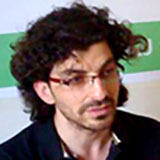
Activist, journalist, Assistant Editor-in-Chief of Freedomraise and Director of its main office in Douma / Eastern Ghouta, holding a degree in Arts, English Language Department, Damascus University. He is also director of the office of the Syrian Non-violence Movement in Damascus Suburbs.

